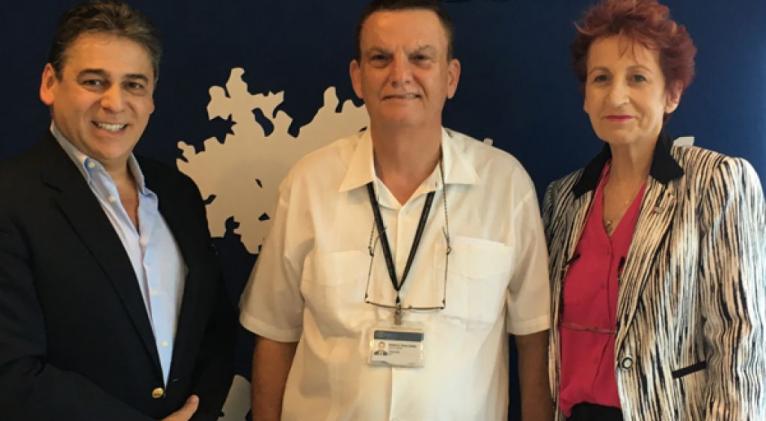Head of Cuban Regulatory Agency to Make First Appearance at Regulatory Convergence
especiales

This year, for the first time ever at RAPS’ Regulatory Convergence, attendees will have the opportunity to hear directly from Cuba’s top regulatory authority. Rafael Perez Cristia, head of the National Regulatory Agency, Cuba, will participate in two sessions—Latin America: Perspectives and Challenges Moving Forward, Part 2 and Latin American Regulations and Market Access: Orphan Drugs, Rare Diseases and Low Incidence Cancer—both taking place Tuesday, 20 September. Perez Cristia will discuss the country’s regulatory environment and biotech industry.
We connected with the session leaders for each of the two sessions, Fernando Ferrer, MBA, managing partner, Multinational Partnerships LLC, and Silvia Bendiner, director regulatory affairs, Latin America, Mapi Group (pictured with Rafael Perez Cristia), to ask them about Cuba’s regulatory system, diplomatic relations with the US and more. Following are their joint responses.
Regulatory Focus: What is the current state of life sciences in Cuba?
Fernando Ferrer and Silvia Bendiner: The pharmaceutical industry in Cuba has been very efficient and prosperous covering the needs and demands of the Cuban population with vaccines, biological products and basic drugs (such as generics or similar products) based on their local manufacture resulting from the country’s basic research and development, and product pipeline. To-date, Cuba has deposited more than 2,000 patents for drug products worldwide and exports to more than 40 countries across the Americas, Europe, Africa and Asia.
RF: What effect will the US reopening diplomatic Relations with Cuba have on the country's healthcare industry?
FF and SB: The step of initiating diplomatic relations in 2014 has been very important to begin to relax restrictions and opening opportunities to negotiate agreements between companies and governments of both countries.
Diplomatic relations should allow the fall of the blockage imposed on Cuba by the US, positively impacting market access for products and services on both directions. Trade liberalization with the US will be an important step forward in accelerating the integration of Cuba into a system of free supply and demand.
RF: What is Cuba's regulatory system like?
FF and SB: Cuba's regulatory system is aligned with the American region. In fact, Cuba is among the eight reference regulatory agencies of the Pan American Health Organization (PAHO) in the Americas, together with the US, Canada and five Latin American countries
RF: What do you expect Dr. Rafael Perez Cristia, head of Cuba's National Regulatory Agency, to talk about at RAPS 'Regulatory Convergence?
FF and SB: Dr. Perez Cristia will provide the updated vision of the Cuban regulatory agency and how it is aligned with international agencies, will describe the achievements of the public health system, and give insights of patents and innovative products developed in Cuba by its national industry, particularly in the areas of vaccines and biologicals for the treatment of cancer and diabetes.
Dr. Perez Cristina also will review the opportunities for foreign companies to engage with clinical development activities in Cuba as the country has an advanced diagnostic, treatment and health monitoring system across the country’s population, starting from birth, monitoring on an ongoing basis the complete clinical history of its citizens. Essentially, having a patient registry of 11 million people. This unique aspect of the Cuban healthcare system has been made possible as it is a full-fledged state-established health system also including early patient diagnosis (women in the early stages of pregnancy) at hospitals or public healthcare-assisted offices, making available equal resources and access to medicines in every state pharmacy.













Add new comment